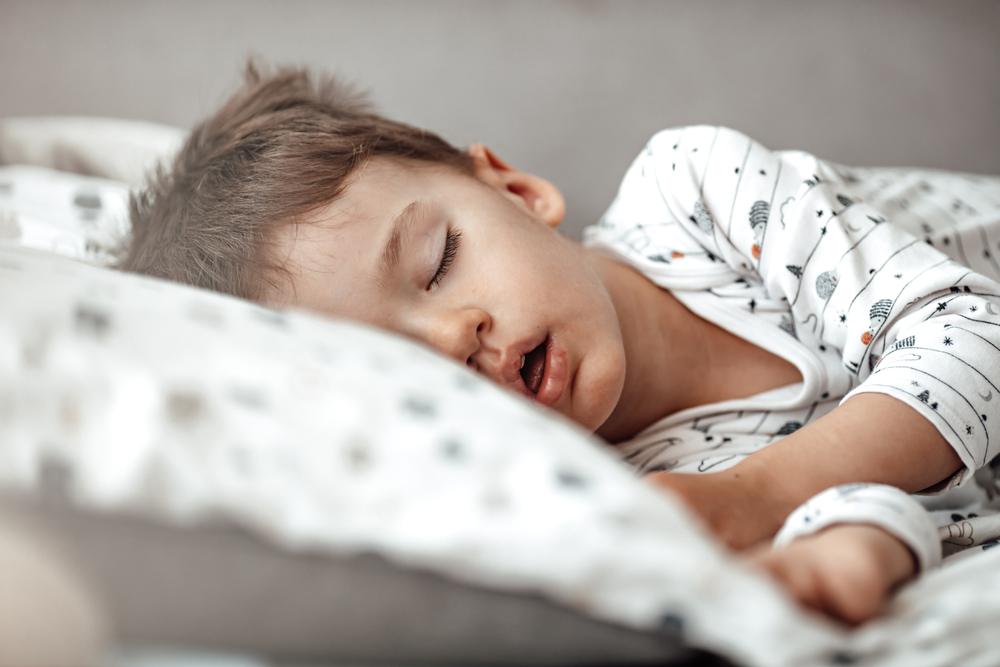Sleep apnea is a well-known condition that affects adults, but did you know it can also impact children? Pediatric obstructive sleep apnea (OSA) is a serious disorder that can interfere with your child’s development and well-being. Recognizing the signs early and seeking appropriate treatment is crucial for ensuring your child’s healthy growth and quality of life.
What is pediatric obstructive sleep apnea?
Pediatric obstructive sleep apnea (OSA) occurs when a child’s breathing temporarily stops during sleep. These pauses, which can occur multiple times throughout the night, are typically caused by an obstruction in the upper airway. The obstruction can block airflow through the nose and mouth, affecting oxygen levels and disrupting the child’s natural sleep cycle.
OSA is most common in children between the ages of 3 and 6, but it can occur at any age. While adults with sleep apnea typically experience fatigue and daytime sleepiness, children may show more behavioral symptoms that can often be overlooked or misinterpreted as other conditions.
Unlike adults, children with sleep apnea may not exhibit the typical daytime drowsiness. Instead, they may display hyperactivity, mood swings, or difficulty concentrating. This can lead to issues at school and impact their ability to perform daily tasks.
Common symptoms of pediatric sleep apnea
If your child has obstructive sleep apnea, you may notice a range of signs and symptoms. The most common symptom is snoring, although not all children with OSA snore. Other red flags include:
- Gasping or choking sounds during sleep
- Frequent bedwetting or accidents
- Sleepwalking or night terrors
- Daytime irritability, mood swings, or excessive crankiness
- Difficulty focusing or problems at school
- Mouth breathing while awake, especially during physical activities
- Morning headaches after waking up
If your child consistently exhibits these symptoms, it is important to consult with a healthcare provider to rule out obstructive sleep apnea.
Risk factors for pediatric obstructive sleep apnea
Several factors can increase a child’s likelihood of developing sleep apnea. Some of these include:
- Family history of sleep apnea: Genetics play a significant role in the development of OSA.
- Obesity: Being overweight can lead to excess tissue in the throat, which can block the airway.
- Down syndrome or cerebral palsy: Children with these conditions are at higher risk due to muscle tone issues affecting the airway.
- Enlarged tonsils or adenoids: These common childhood conditions can obstruct the airway during sleep.
- Anatomical issues: Structural issues, such as a small jaw or large tongue, may contribute to airway collapse.
While many children with OSA exhibit one or more of these risk factors, it is possible for a child without these issues to still develop the condition.
What should you do if you suspect your child has OSA?
If you suspect your child may be suffering from sleep apnea, it’s important to seek professional evaluation as soon as possible. An Ear, Nose, and Throat (ENT) specialist can perform a thorough examination and may recommend a sleep study to diagnose the condition. A sleep study will provide detailed information about your child’s breathing patterns during sleep, allowing healthcare providers to determine the severity of the condition.
Treatment options for pediatric sleep apnea vary depending on the underlying cause and severity of the disorder. Some of the most common treatment approaches include:
- Surgical removal of enlarged tonsils or adenoids: If these are causing the obstruction, their removal can significantly improve symptoms.
- Lifestyle changes: Encouraging healthy eating habits and regular exercise can help children who are overweight and may improve the condition.
- Continuous Positive Airway Pressure (CPAP) therapy: For more severe cases, a CPAP machine can help keep the airway open by delivering a continuous stream of air through a mask.
Long-term effects of untreated sleep apnea in children
Untreated obstructive sleep apnea can have serious long-term effects. Beyond the immediate disruptions to your child’s sleep, it can lead to issues with learning, behavior, and emotional health. Studies show that children with sleep apnea are more likely to struggle academically, develop mood disorders, and experience problems with social interactions.
Over time, sleep apnea can also affect your child’s growth. The lack of restful sleep can interfere with the production of growth hormones, potentially leading to stunted physical development.
Sleep apnea can have serious health consequences for children, including long-term behavioral, cognitive, and physical development problems if left untreated. Chronic cases of sleep apnea may lead to permanent heart and lung damage due to the consistent drop in oxygen levels during sleep.
Take action: consult an ENT specialist
If you notice any of the symptoms of sleep apnea in your child, don’t wait to seek help. An ENT specialist can evaluate your child’s condition, determine the underlying cause, and recommend the appropriate treatment to ensure better sleep, health, and overall well-being. Early intervention is key in preventing the long-term effects of obstructive sleep apnea.
Find an ENT specialist near you to schedule a consultation and address your child’s sleep concerns today.
